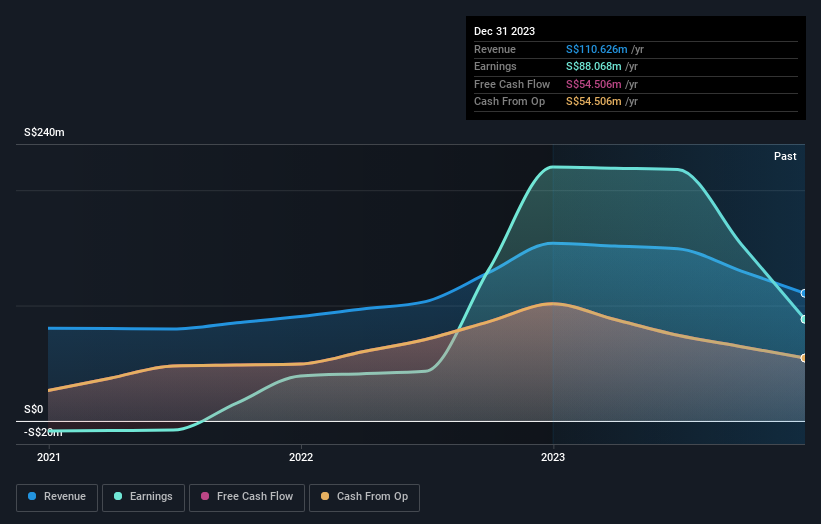Hong Fok Corporation Limited (SGX:H30) stock most popular amongst private companies who own 40%, while individual investors hold 32%
Key Insights
The considerable ownership by private companies in Hong Fok indicates that they collectively have a greater say in management and business strategy
53% of the business is held by the top 4 shareholders
A look at the shareholders of Hong Fok Corporation Limited (SGX:H30) can tell us which group is most powerful. With 40% stake, private companies possess the maximum shares in the company. Put another way, the group faces the maximum upside potential (or downside risk).
And individual investors on the other hand have a 32% ownership in the company.
In the chart below, we zoom in on the different ownership groups of Hong Fok.
Check out our latest analysis for Hong Fok
What Does The Institutional Ownership Tell Us About Hong Fok?
Institutional investors commonly compare their own returns to the returns of a commonly followed index. So they generally do consider buying larger companies that are included in the relevant benchmark index.
Less than 5% of Hong Fok is held by institutional investors. This suggests that some funds have the company in their sights, but many have not yet bought shares in it. If the business gets stronger from here, we could see a situation where more institutions are keen to buy. When multiple institutional investors want to buy shares, we often see a rising share price. The past revenue trajectory (shown below) can be an indication of future growth, but there are no guarantees.
Hong Fok is not owned by hedge funds. Our data shows that Hong Fok Land Holding Limited is the largest shareholder with 22% of shares outstanding. Sim Eng Cheong is the second largest shareholder owning 14% of common stock, and P.C. Cheong Pte Ltd holds about 12% of the company stock. Sim Eng Cheong, who is the second-largest shareholder, also happens to hold the title of Co-Chief Executive Officer. In addition, we found that Pin Chuan Cheong, the CEO has 2.8% of the shares allocated to their name.
Our research also brought to light the fact that roughly 53% of the company is controlled by the top 4 shareholders suggesting that these owners wield significant influence on the business.
While it makes sense to study institutional ownership data for a company, it also makes sense to study analyst sentiments to know which way the wind is blowing. Our information suggests that there isn't any analyst coverage of the stock, so it is probably little known.
Insider Ownership Of Hong Fok
The definition of an insider can differ slightly between different countries, but members of the board of directors always count. Company management run the business, but the CEO will answer to the board, even if he or she is a member of it.
Most consider insider ownership a positive because it can indicate the board is well aligned with other shareholders. However, on some occasions too much power is concentrated within this group.
Our most recent data indicates that insiders own a reasonable proportion of Hong Fok Corporation Limited. It has a market capitalization of just S$664m, and insiders have S$162m worth of shares in their own names. It is great to see insiders so invested in the business. It might be worth checking if those insiders have been buying recently.
General Public Ownership
The general public-- including retail investors -- own 32% stake in the company, and hence can't easily be ignored. While this group can't necessarily call the shots, it can certainly have a real influence on how the company is run.
Private Company Ownership
We can see that Private Companies own 40%, of the shares on issue. Private companies may be related parties. Sometimes insiders have an interest in a public company through a holding in a private company, rather than in their own capacity as an individual. While it's hard to draw any broad stroke conclusions, it is worth noting as an area for further research.
Next Steps:
I find it very interesting to look at who exactly owns a company. But to truly gain insight, we need to consider other information, too. Like risks, for instance. Every company has them, and we've spotted 3 warning signs for Hong Fok (of which 1 can't be ignored!) you should know about.
Of course, you might find a fantastic investment by looking elsewhere. So take a peek at this free list of interesting companies.
NB: Figures in this article are calculated using data from the last twelve months, which refer to the 12-month period ending on the last date of the month the financial statement is dated. This may not be consistent with full year annual report figures.
Have feedback on this article? Concerned about the content? Get in touch with us directly. Alternatively, email editorial-team (at) simplywallst.com.
This article by Simply Wall St is general in nature. We provide commentary based on historical data and analyst forecasts only using an unbiased methodology and our articles are not intended to be financial advice. It does not constitute a recommendation to buy or sell any stock, and does not take account of your objectives, or your financial situation. We aim to bring you long-term focused analysis driven by fundamental data. Note that our analysis may not factor in the latest price-sensitive company announcements or qualitative material. Simply Wall St has no position in any stocks mentioned.

 Yahoo Finance
Yahoo Finance 

